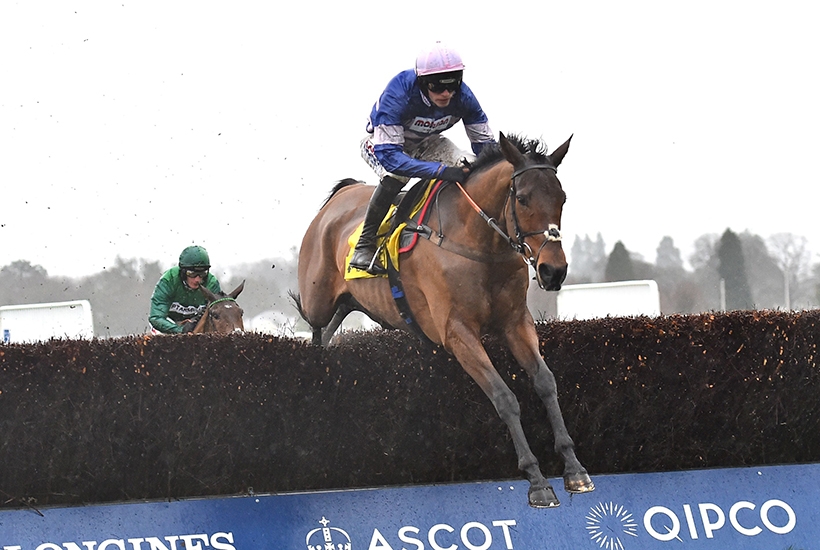Few jumpers have a better record at Ascot than the Paul Nicholls-trained Cyrname. He triumphed in the Betfair Chase at the Berkshire course in February 2019 by 17 lengths with three Grade One winners behind him. It was at Ascot in November, in an enthralling duel, that he ended the mighty Altior’s record of 19 successive victories over jumps and Cyrname was a short-priced favourite last Saturday to take a second Betfair Chase with only three horses daring to join the highest-rated chaser in Britain. But it was not to be. On rain-soaked turf, soon officially changed from soft to heavy, Cyrname was never going with quite his usual zest. When Riders Onthe Storm loomed up beside him three fences out, Cyrname lacked the spark to respond and Harry Cobden’s mount was back in a tired third place when at the last fence he never seemed to take off properly and crashed heavily on landing.
What looked like a shocking fall drew gasps from the crowd and as Cobden dashed consolingly to the stricken Cyrname’s head few of us were watching Riders Onthe Storm progress to the winning post to score a victory presented to him when the 40-1 challenger Traffic Fluide also tumbled at the last. Many of us were numb with shock and as the screens were erected around Cyrname with praiseworthy speed by the Ascot staff I found myself immediately thinking of the racecourse departures of the likes of One Man, Dawn Run, Dunkirk and Buona Notte. Sometimes it seems that the worst only happens to the most exuberant, the best and boldest jumpers.
Compared with other animals we love, their sheer size and athleticism give horses a kind of majesty and an imagined impregnability when you stand beside them. Sport has no better spectacle than watching them soar over obstacles with the breathtaking grace of a herd of impala. When things go wrong, though, there is no sight more pitiable than the heaving flanks of an equine athlete prone on the turf. As the seconds ticked away into minutes, I walked to the parade ring duty-bound to hear the victorious recount their story of a success, which none of them would have wished to have come in the way it did. But then suddenly there was a cheer from the stands behind us and on the TV screens came the happy sight of a mud-spattered but seemingly sound Cyrname back on his feet and being led away by his tearful lad. He had been badly winded but no worse. His season is over, but not, thankfully, his career.
One life that has just ended was that of former jump jockey Paddy Broderick, who will for ever be associated with the great Night Nurse whom he rode to victory in the Champion Hurdles of 1976 and 1977 and on 16 other occasions. I once asked former champion trainer Peter Easterby about the front-running Night Nurse and his regular jockey and he told me: ‘We buy horses to sell. That’s what we do. The ninth man who came to see him and bought him was a Mr Rudkin in his eighties. We pinched a little race at Ripon but Night Nurse wasn’t very good on the Flat so we decided to give him a school and he shaped very well. When I told Mr Rudkin we were going to try him over hurdles he was fine with it. A few minutes later the phone went again and it was Mr Rudkin’s lady friend who said, “You run him over hurdles over my dead body.” I thought, “How do we get out of this one?” I rang him back and said, “Look, I’ll take the horse and I’ll give you your money back if you don’t want to run him over hurdles.” He said, “That’s good of you,” and I sent him a cheque for £1,000. I then rang an old school friend Reg Spencer, who was a property auctioneer, and said, “He shapes well. He’s £1,500.” That’s how he got him!’.
Easterby added: ‘Night Nurse was a miserable old bugger in his box. He would kick you if he could. I don’t know whether he was a natural front runner or whether Paddy Broderick was. Probably a bit of both. You couldn’t give Paddy any orders. He never heard you. He never listened — and he was usually right.’
Broderick, who was no stylist but a true horseman, said himself that it was no use trying to dictate tactics to Night Nurse: ‘He just did his own thing.’ He truly was one of the old school, describing his five-year apprenticeship in Ireland as ‘Half a crown a week, one suit in five years and not a brain in my head.’ In 1965 he was unconscious for ten days after a fall at Uttoxeter and long suffered from double vision and headaches. Ironically it was a rare fall with Night Nurse in the Christmas Hurdle at Kempton in 1978 that ended Broderick’s career. He was told that one more knock on the head and he would be a cabbage.






Comments